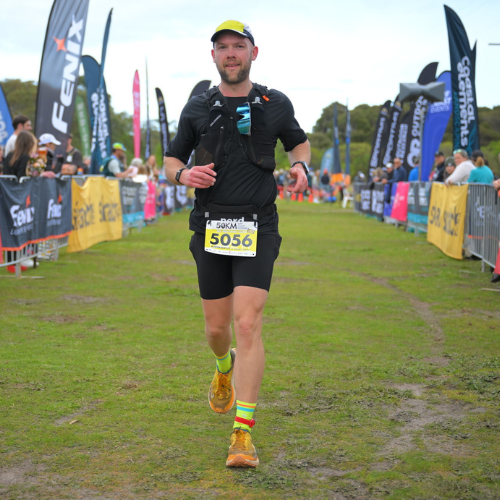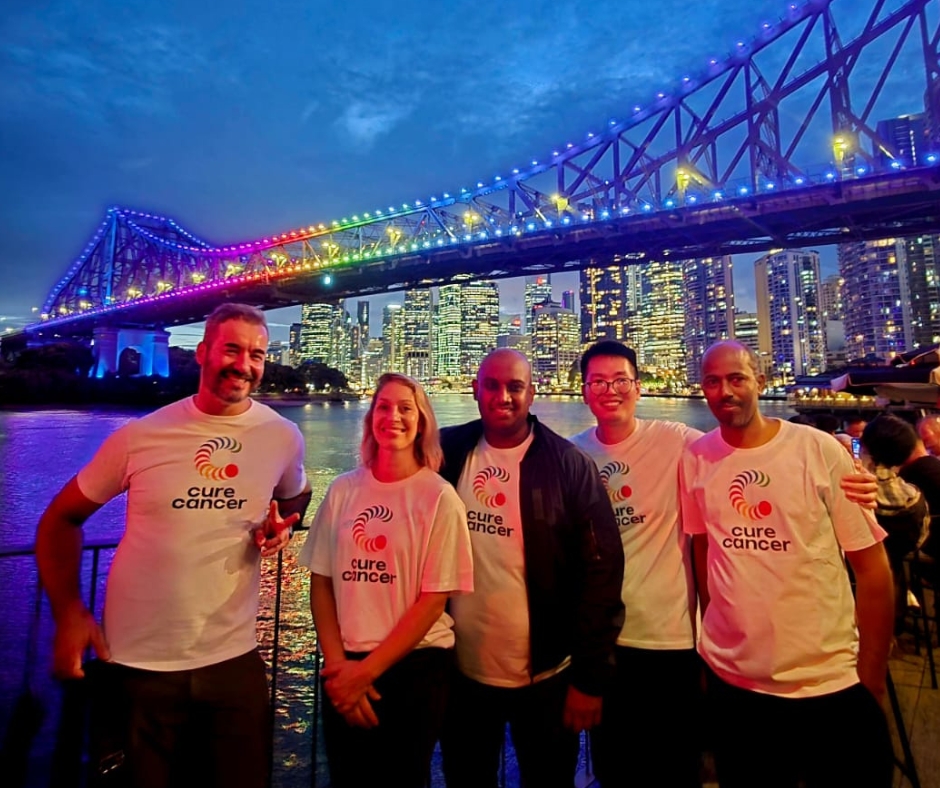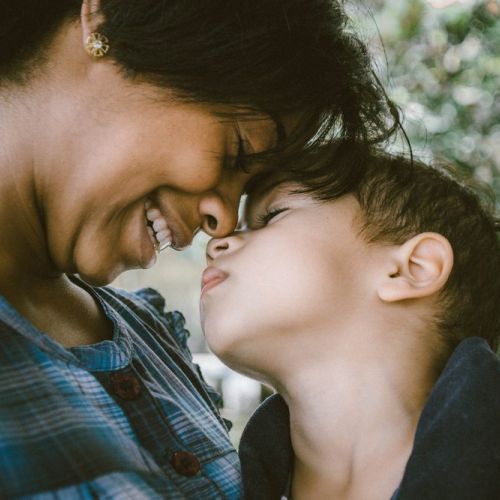‘If it wasn’t for research, I wouldn’t be here today’: Dom Scoleri on living beyond his myeloma prognosis
By Sylvia Lee | 21 November 2024
Editor’s note: Since this story was first published, Dom Scoleri has sadly passed away (2025). Dom generously shared his experience to help raise awareness, offer hope to others, and highlight why research matters for people living with multiple myeloma. We remain deeply grateful for the time, warmth, and candour he gave our community, and we extend our heartfelt condolences to Dom’s family, friends, and everyone who loved him.

Dom Scoleri with Rocky, his furry friend. Image: Supplied
Every day, Dom Scoleri takes Rocky, his Maltese-Yorkie cross (who thinks he’s a German Shepherd), on their morning walk. Taking in his beautiful surrounds in Adelaide with his furry friend by his side, he tries his best to live in the present as much as he can – a skill that he has learned to cultivate in his decade-long journey of living with multiple myeloma, which has tested his resilience time and time again.
“It’s been really challenging to keep the strong discipline and mental resilience needed to manage how I live with the disease, but I’ve always been a positive person – except in the last couple of years, where my mental health has struggled,” he admits.
Dom is among 18,000 Australians currently living with multiple myeloma, an incurable form of blood cancer that begins in the bone marrow. While patients do go into remission following successful, often aggressive, treatment, the cancer will return for most, as it did for Dom after being cancer-free for four years. In addition, up to 80% of patients will face chronic pain as their disease progresses and severe side effects from treatments, to which they will often develop resistance.
It’s been an emotional rollercoaster. Myeloma is an incredibly smart cancer – it will continue to morph into a different mutation. When your treatments stop working, they have to find something else that works. Then you start thinking, ‘How am I going to cope? Is this going to work? What does the future hold?’ It’s so easy to fall into that negative spiral, and once you’re there, it’s hard to pull yourself out.”
Unfortunately, research on myeloma receives limited funding even though it is known to have the poorest quality of life of all cancers, and only half of patients will survive for more than five years upon diagnosis. Yet Dom has continued to defy the odds, turning his experience into an opportunity to help others.
The myeloma diagnosis that changed everything

Dom Scoleri celebrating his mum's 80th birthday with his sisters. Image: Supplied
In 2014, Dom finally received his multiple myeloma diagnosis. It came as a relief after months of unexplained fatigue and pain, compounded by a debilitating Guillain-Barré syndrome (GBS) diagnosis two years earlier. Unknown to him at the time, he had been exercising and lifting weights with spinal crush fractures, a common complication of myeloma that had yet to be diagnosed.
At last, there was an explanation for his symptoms. But it also meant coming to terms with a 5-year life expectancy. Worse still, he now had to break the news to his family, “a very emotional bunch”.
Telling his four sisters, 80-year-old mum, and son that he was now living with an incurable, terminal disease was one of the hardest things he’s had to do. “I reckon it took me well over six months to tell my mum, just because of the stigma around cancer. My younger sisters completely lost it. Everyone started preparing for my funeral, but I was like, 'Hang on a minute, I'm still here. I'm not going anywhere just yet!'”
"What surprised me even more was the reaction from my friends. A lot of them drifted away. They just couldn't cope. I was going through treatment, but people stopped inviting me to functions, and some cut off contact entirely. You soon learn who your true friends are.”

Dom and his son on one of many adventures into the Tasmanian wilderness. Image: Supplied

Dom with his mum. Image: Supplied
Despite this, he’s received ample support from his family, neighbours and workplace. "My neighbors would do food drops for me, and my sisters and mum would prepare food packs and drop them off at the front door,” he shares. “I'm pretty close with my son, who keeps a close eye on me as well."
Through myeloma support groups, Dom found another lifeline and a sense of community. “I became involved with myeloma support groups. I learned so much from talking to other people with myeloma and now, at least I was able to share my story.”
Living well with myeloma: The MyWELL Study

Dom Scoleri (middle), an Associate Researcher, with the MyWELL Study team. Dr Melissa Cantley (third from left) is a past Cure Cancer grant recipient. Image: Supplied
A newly retired Project Manager, Dom has learned to cope with living with multiple myeloma by treating his health like any other project. “Once I started treatment, I didn’t focus on my prognosis at all. Managing my disease and general health became my project – I took a ‘holistic’ approach at managing my health,” Dom explains. “This has helped me keep the emotion out of it because it feels like I still have some control.”
Dom has created extensive spreadsheets to chronicle his cancer journey and has built a strong, collaborative medical team. Taking an active role in his own care, he is not afraid to challenge his doctors if he disagrees with their approach. "I don't work for health professionals or the medical system,” he says. “They work for me. They're my team."
Today, Dom channels his knowledge and resilience into his work as a passionate patient advocate and Associate Researcher at SAHMRI (South Australian Health and Medical Research Institute), collaborating with myeloma researchers like Dr Melissa Cantley, whose work Cure Cancer funded in 2020.
Dom is working closely with Dr Cantley, her fellow SAHMRI researchers, and researchers from institutes across the country, on a project called the MyWELL Study, which he conceived. Inspired by Dom’s struggles with mental health, MyWELL is a tailored mental health program for people living with myeloma that focuses on mindfulness and resilience, which have helped him keep his head above water.

Dom Scoleri and Dr Melissa Cantley at SAHMRI. Image: Cure Cancer
Recognising that myeloma patients report some of the highest rates of anxiety and depression compared to patients living with other cancers, Dom says mental and emotional wellbeing are as vital as medical treatment. “I think it's extremely important that the people living with cancer have a toolkit that's available to help them to understand the complex emotions they're going through, and how they can improve their mental state to cope better,” he says.
“Time and again, we heard about the psychological impacts and the lack of wellbeing and mental health support for those living with myeloma,” Dr Cantley adds. “Together with Dom, we launched this important project, and we were recently successful in obtaining a Medical Research Future Fund (MRFF) grant that aims to empower people with myeloma to not just live, but live well.”
‘Without research, we don’t have progress’: A decade of breakthroughs has helped Dom defy his myeloma prognosis

Dom shares his spreadsheets with Cure Cancer. This one tracks his blood glucose levels against milestones in his cancer journey. Source: Dom Scoleri
Dom has seen firsthand how far research on myeloma has come. “With myeloma, the amount of work that’s been done in the last decade has been incredible. We’ve gone from an automatic death sentence to being able to manage myeloma as a chronic disease. I never would have thought I’d still be here 10 years later.”
He credits his survival to a successful stem cell transplant and being on treatment regimens that involved new therapies. Inspired by fellow myeloma survivors who had entered clinical trials, Dom didn’t hesitate to participate in one between 2015 to 2017 despite the risk of adverse effects. “If what they learned from me helps someone in the future, then it would all be worth it.”
“If it wasn't for clinical trials, and if it wasn't for research, I wouldn't be here today.”

Rocky has been by Dom's side for almost 16 years.
Dom took part in a worldwide study that tested a promising new treatment. While some participants received the new drug and others a placebo, they weren't told which group they were in. Once the trial ended, he learnt that he had, in fact, received the new treatment. It was a turning point for him: “The trial was hugely successful. For four years, I was cancer-free.”
“Without research, we don’t have progress,” he continues. “You can never underestimate the importance of clinical trials, not only for the development of new drugs, but it can also give you an improved quality of life and reduce your side effects.”
‘I’m at peace with what I’m doing’: A life lived with purpose

Dom on another one of his adventures on Cradle Mountain, Tasmania. Image: Supplied
Some days are harder than others, but Dom is determined to not let his disease stop him. He still has many more outdoor adventures with his son, morning walks with Rocky, and dinners with his 90-year-old mum and sisters to look forward to.
"I really hate the word fighting with cancer. I just don't like using that term at all. To me, it's negative. You know, I'm living with it,” he says.
“I have purpose in life and I’m at peace with what I’m doing. I know I have an incurable disease. Sooner or later, my time will come, but I don’t focus on that. I try and live for today as much as I can.”
Dom’s advice for others living with myeloma
“Hang in there. It is an extremely difficult journey, but it's really important to make time for yourself and live in the present. No matter how hard it is, sometimes you need to push through the pain to keep your body and mind in shape.
"I don't like using the word happiness because it can mean a lot of different things to different people, but for me, I need to be at peace with myself and that's where my happiness comes from.”










